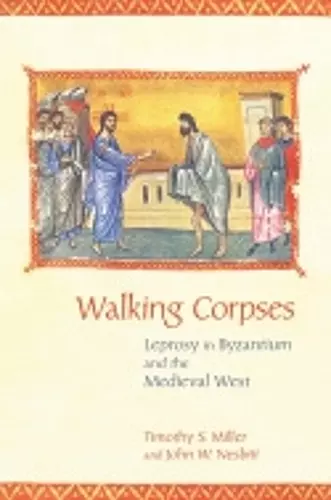Walking Corpses
Leprosy in Byzantium and the Medieval West
Timothy S Miller author John W Nesbitt author
Format:Hardback
Publisher:Cornell University Press
Published:19th Apr '14
Currently unavailable, and unfortunately no date known when it will be back

Leprosy has afflicted humans for thousands of years. It wasn't until the twelfth century, however, that the dreaded disease entered the collective psyche of Western society, thanks to a frightening epidemic that ravaged Catholic Europe. The Church responded by constructing charitable institutions called leprosariums to treat the rapidly expanding number of victims. As important as these events were, Timothy Miller and John Nesbitt remind us that the history of leprosy in the West is incomplete without also considering the Byzantine Empire, which confronted leprosy and its effects well before the Latin West. In Walking Corpses, they offer the first account of medieval leprosy that integrates the history of East and West.In their informative and engaging account, Miller and Nesbitt challenge a number of misperceptions and myths about medieval attitudes toward leprosy (known today as Hansen’s disease). They argue that ethical writings from the Byzantine world and from Catholic Europe never branded leprosy as punishment for sin; rather, theologians and moralists saw the disease as a mark of God’s favor on those chosen for heaven. The stimulus to ban lepers from society and ultimately to persecute them came not from Christian influence but from Germanic customary law. Leprosariums were not prisons to punish lepers but were centers of care to offer them support; some even provided both male and female residents the opportunity to govern their own communities under a form of written constitution. Informed by recent bioarchaeological research that has vastly expanded knowledge of the disease and its treatment by medieval society, Walking Corpses also includes three key Greek texts regarding leprosy (one of which has never been translated into English before).
'Wretched corpses,' 'moving cadavers,' 'creeping bodies.' Fourth-century Byzantine bishops used these phrases to describe men and women afflicted with leprosy. Timothy S. Miller and John W. Nesbitt invite readers to reinterpret this dramatic language in their book, Walking Corpses, a useful comparative study of religious, medical, and legal reactions to leprosy in Byzantium and the medieval Latin West.
* Isis *Walking Corpses impresses as a book filling gaps in existing scholarship, and provides a welcome resource for the teaching of medieval leprosy, a fraught and fascinating topic in undergraduate classrooms. Of particular value is the appendix with the author's edition of relevant texts on leprosy. Walking Corpses both expands the field of study and shows directions in which this necessary endeavor can be continued.
* Comitatus *Walking Corpses provides a fresh study of leprosy in the medieval world.The book will certainly stimulate further discussion on the history of leprosy in Byzantium and the medieval West
* Bryn Mawr Classical Review *This is a compact, accessible study, which delivers on its promise to bring the insights provided by studies of late antique Greek leprosy to bear on medieval Latin ones.
* History of Religions *In Walking Corpses, two renowned medieval historians have decided to enrich the associated subject with an astute scholarly perspective. Their mutual cooperation has resulted in a sweeping and innovative analysis of the discourse of leprosy in the medieval East and West.
* Journal of Social Sciences and Humanities *Walking Corpses offers the nonspecialist audience a very readable introduction to a fascinating subject and a valuable example of the importance of studying the Byzantine origins of medieval institutions.
* Church History *This engaging book represents the culmination of over forty years of scholarship by both authors on the social, cultural, and political history of Byzantium. Walking Corpses is a useful volume for highlighting the urgent need for more text editing and detailed case studies to fill gaps in our knowledge of medieval leprosy.
* The American Historical ReviISBN: 9780801451355
Dimensions: unknown
Weight: 907g
264 pages